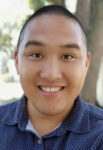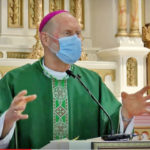I’m not going to lie. When I hear the Solemnity of “Christ the King” is coming, I kind of scratch my head. I bet some of you do, too. The idea of a “king” as an actual lived experience is pretty foreign to people today, especially us “middle-of-nowhere” Iowans. Pair that with some not-so-great depictions and representations of kings from history and now that itch on my head is starting to scab. But, let’s give it a shot.

The beginning of the liturgical year is Advent/Christmas where God responded to the deepest yearning of our hearts by becoming one of us, specifically as “friend of sinners.” The Solemnity of Our Lord Jesus Christ, King of the Universe, aka Christ the King, is a relatively new feast day (only 96 years young!) promulgated in 1925 by Pope Pius XI. This feast day responded to the increasing secularization (the removal of God) in the world’s political, cultural and economic movements. “Christ, King of the Universe” is our “friend.” How awesome is that?
Ask yourself. Would you love and trust a king with your life who wasn’t also your friend? Without friendship, trust and love, the most we can offer is reluctant obedience that can lead to suspicion of Christ’s word and even criticism of his laws and the structure of his “Kingdom.”
Think about it this way. The first lie fed to Adam and Eve by the serpent that led to The Fall, according to the account in Genesis, was that they couldn’t trust God. Their lack of trust resulted in the oppression of humanity to the “powers and structures” of sin and death. Secularization, removing God from the picture, is ultimately a distrust in God that “perpetuates the powers and systems that bind and oppress us,” to use modern language. The Solemnity of Christ the King reminds us that we have a friend and King in Jesus who is in control, who has already won the battle, and that his kingly wisdom and mercy is the answer to all earthly, and, more importantly, spiritual oppression.
Oftentimes, we still choose the wisdom and power of earthly “kings and kingdoms.” During the time of the Prophet Samuel, Israel had God as its liberator and protector, and still, the people asked for an earthly king. God said to Samuel, “Listen to whatever the people say. You are not the one they are rejecting. They are rejecting me as their king” (1 Samuel 8:7).
When I first read that, my heart broke. I remembered all the times our Lord wanted to care for me as king and I rejected him. I thought I could lead my family with my own strength, wisdom and knowledge. It led to so much suffering and woundedness. When I surrendered my life to Christ our King, I found who I was as son, husband and father. I was liberated.
To undo the damage from the lie that led to distrust, God untangled the lie. That’s what brings us back to the beginning of the liturgical year, Advent/Christmas, when he enters into our broken world, our broken home and our broken hearts, and sits at table with us and becomes “friend.” Then, he says to us, “No one has greater love than this, to lay down one’s life for one’s friends,” and he does exactly that on the cross. On the cross, he effectively says, “This is how much I love you. Trust me and let me be King.”
Though Christ is already King of the Universe, we can still reject his wisdom, truth and grace. How have we rejected Christ in our efforts to bring justice and peace in the world? Have we relied too much on the wisdom of the world’s “kings and kingdoms”? Lastly, where in your heart do you need Christ our King to heal and redeem you? Trust in our Lord and let him reign in your life, and discover the freedom he won for you and me on the cross.
(Mitchell Narvasa is pastoral associate/discipleship & evangelization, for St. John Vianney Parish in Bettendorf.)











